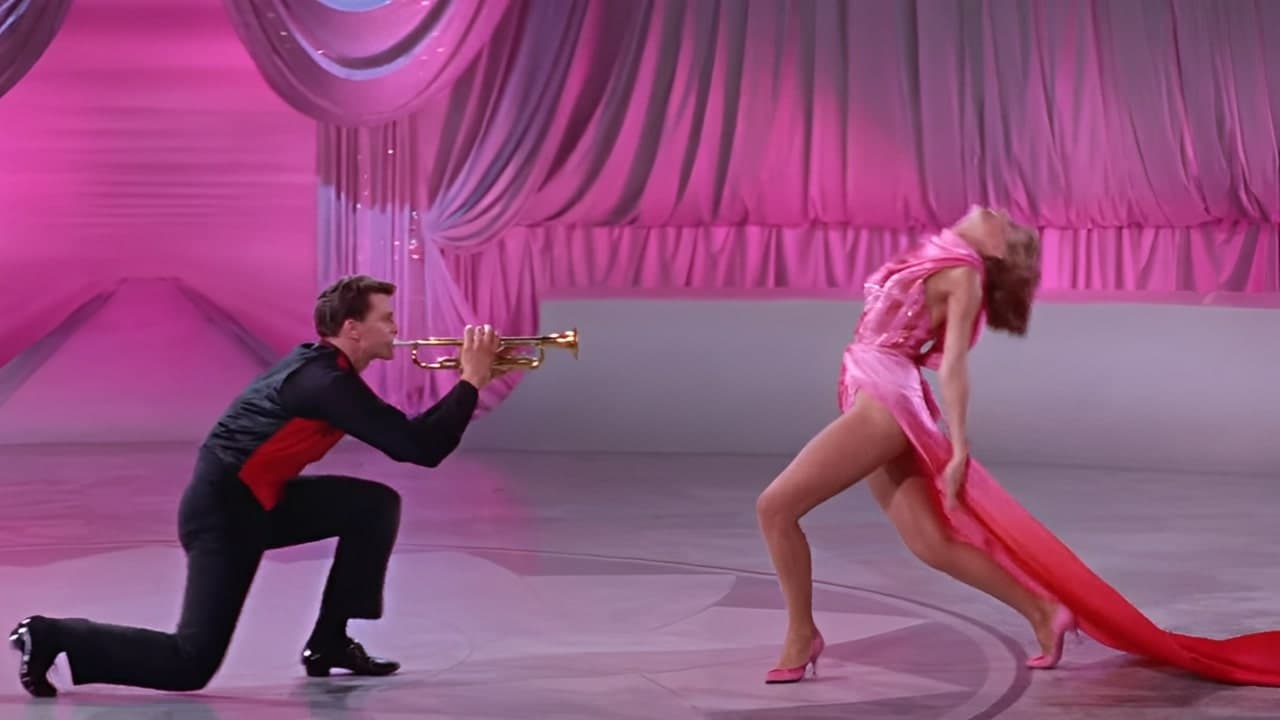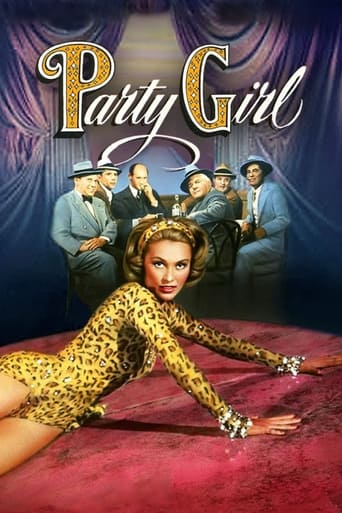

Very well executed
... View MoreOverrated and overhyped
... View MoreExcellent, Without a doubt!!
... View MoreBest movie ever!
... View MoreReally a stunning production. The use of color, especially during the dance sequences, was mesmerizing. It seems odd to say that about what is essentially a film noir, but the fireworks of sets and costumes make Party Girl unique.Still, it takes at least an hour for the plot to get rolling. Then the sociopath Cookie suddenly puts Robert Taylor's character in jeopardy; and Taylor isn't in the clear until the last scene. All the while we're left wondering if Cyd Charisse's character is going to be doused with acid. Fortunately, the prosecutor comes up with a clever strategy to force Lee J. Cobb's hand. It would seem obvious, though, that Vicki (Cyd Charisse) will be abducted by Angelo's (Cobb's) goons. Also, after Taylor's released from jail and finds Cobb, why would the police launch an all-out assault on the building, since Taylor could easily get killed too? The fact that he had a sentimental talk with the cops at the very end shows that they were on the same side.The movie almost lost me with the side-trip to Europe. What was the purpose of Taylor's having an old injury that needed surgery anyway? If we had gone directly from Taylor's romance with Charisse right to the complications with Cobb and Cookie we would have lost nothing. We would've been spared the rare on-location driving scene from the doctor's office in which (as noted in the Goofs column) all the other cars are from the 1950s.Which leaves me wondering: why the movie was set in the 30s? There were still plenty of ruthless gangsters to worry about in 1958. And, well, why not make Cobb an Irish gangster? He looks about as Italian as a Viking. Taylor's plea to Cobb that, despite all his bravado, the gangster is really a decent guy, who wouldn't stoop so low as to disfigure a woman, is full of tension. It's clear that Cobb is fascinated by Taylor, almost spell-bound; but never has the courage to stop striking out against his perceived enemies. Except for that well-written scene, though, Taylor's performance isn't very nuanced, not even as much as Cobb's. The fact that Taylor's Farrell is married has almost no bearing on the plot. That would be strange in any era, even more so in tbe 30s or 50s. A strange, awkwardly-paced, but extremely watchable movie. Charisse's dancing is great stuff, and that nightclub just glows beautifully. Cobb is at his caged-animal best, and there's plenty of wild gun-play. Party Girl is definitely worth looking at.
... View MoreOf course we have all seen this type of story line a few times, especially if you enjoy the film 'noire of the 1940s and 1950s era. What sets this crime/film 'noire/romance apart from others is the first class performances of the four main characters. The gorgeous gams of professional dancer Cyd Charisse are on full display in her role as Vicki Gaye and she is the love interest of the smartest criminal defence attorney Thomas Farrell played to perfection by Robert Taylor who unfortunately died in the prime of his life and in his career as a first rate Hollywood star.Thomas Farrel is the lead counsel for mob boss Rico Angelo played by Academy Award best actor nominee Lee J. Cobb who rules his crime empire and the streets below him by fear of death or serious injury to anyone who would even consider double crossing him. Now lawyer Thomas Farrell does have a close working relationship with the mob boss Rico Angelo who pays him top dollar for keeping him and his cronies out of jail even when they are up on murder charges. Such is the case with Louis Canetto played by John Ireland who is charged with murder but gets off due to the masterful defence strategy used by his lawyer, Thomas Farrel. Louis Canetto has his eyes set on the pretty party girl Vicki Gaye but so does defence lead counsel Thomas Farrel. It does not take the gorgeous Cyd Charisse who plays Vicki Gaye long to assess that she will have a much more loving relationship with lawyer Thomas Farrel than she would with the mob underling Louis Canetto.So you can see that this film 'noire has the typical seedy criminal element who require a smart lawyer to continuously defend them, and it has the party girl turned love interest of the brilliant lawyer who is used by the mob boss to get what he wants out of his top notch lawyer Thomas Farrell. Where I see this film excels and where other similar pictures of the era falter is with the high caliber acting of these four main characters such that the film has ended when the audience wants to see more.I give the film a pretty good 7 out of 10 rating.
... View MoreUntypically, for a gangster movie, the main focus of attention in "Party Girl" is on the unlikely love affair that develops between two very different people who work for a notorious gangster in 1930s Chicago. Both lovers are cynical and bruised by their pasts but together find the courage and determination they need to try to extricate themselves from the firm grip that the gangster holds on them.Tommy Farrell (Robert Taylor) is the brilliant lawyer who works for gangster boss Rico Angelo (Lee J Cobb) and regularly displays his talents in court by getting Rico's thugs free of the charges brought against them. Vicki Gaye (Cyd Charisse) is a showgirl who works at Rico's nightclub and makes some extra money by being paid $100 for each of Rico's parties that she attends. At the end of one of these parties, Tommy takes her home where she discovers that her pregnant roommate has committed suicide because her married boyfriend has deserted her. Tommy helps Vicki through the difficult time she has being interviewed by the police following her friend's autopsy and they then start to see each other regularly.The experiences of being crippled in a childhood accident and then suffering the breakdown of his marriage to a woman who became repulsed by his disability made Tommy very bitter and his growing contempt for his employer had only made his disposition worse. A bad experience when she was a 15-year-old had left Vicki with a jaundiced view of men and led to her keeping them at arm's length ever since. The happiness they find together brings some unexpected warmth into their lives and Vicki's loyal to Tommy during the extended period that he takes off to have surgery on his crippled leg. After Tommy makes a successful recovery the couple reunite.When he returns to work in Chicago, Rico wants Tommy to represent an associate of his called Cookie La Motte (Corey Allen) but Tommy initially refuses because his potential client is known to be an extremely violent psychopath. Rico then leaves Tommy with no choice in the matter when he threatens to disfigure Vicki with acid unless Tommy does what he wants. A little later, La Motte jumps bail and Tommy and Vicki get arrested when the state prosecutor takes action against everyone associated with Rico. Pressure is then put on Tommy to disclose everything he knows about Rico's organisation and the decisions he subsequently takes, put his and Vicki's lives in danger before the action that follows eventually leads to the movie's violent conclusion.Robert Taylor and Cyd Charisse are both very convincing in their roles and skilfully make the changes that their characters go through seem perfectly natural. Lee J Cobb is also very powerful in his larger-than-life portrayal of Rico Angelo.In "Party Girl", it's not only the focus of the story that's unusual for a gangster movie as it also features a couple of impressive dance numbers and certain passages in which the whole style of presentation is far more typical of the legendary musicals for which MGM is so well known. Fortunately, these seemingly incongruous elements don't ultimately detract from what is essentially , a very compelling crime drama.
... View MoreQuite possibly Nicholas Ray's most visually eloquent film, the poorly- named Party Girl focuses not on the Cyd Charisse titular character but her romantic interest, mob lawyer Tom Farrell, played with great intensity and dedication by Robert Taylor. Charisse is even more luminous than usual thanks in part to the mesmerizing lighting and camera work utilized by Ray in two major dance numbers obviously included to showcase MGM's most talented dancer. However, Ray was also able to elicit a rather touching albeit somewhat unrealistic performance from Charisse in playing a lonely showgirl drawn to Taylor's disfigured lawyer trapped in the world of defending known criminals.Such a story had been done before many different ways, yet under Ray's direction the film achieves a certain sense of nobility and appreciation. It is not flashy, but not boring either. It is, as much of Ray's work was at the time, workman-like and beautifully crafted. Compared to much of the other features released at the time, Ray's films stand out today as rising above the material he was given to work with.
... View More